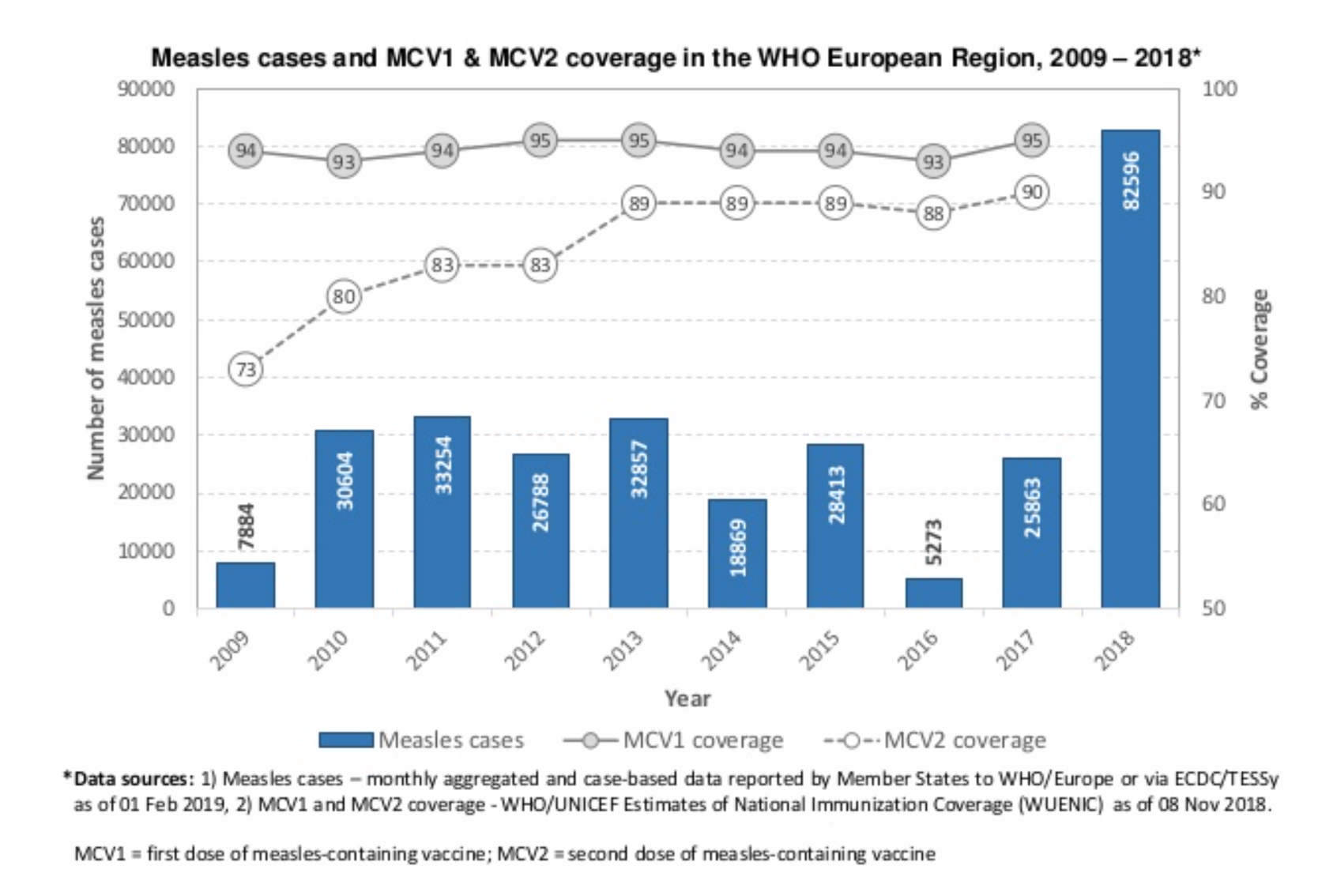A Viral Explosion

Considered eradicated in 2000 by the Center for Disease Control (CDC), measles has made a comeback infecting thousands of people worldwide in 2018 and 2019. According to the BBC, over 41,000 people were infected in Eastern Europe in the first half of 2018. The World Health Organization (WHO) has reported measles cases in 47 out of the 53 countries that make up the WHO European region. Currently, there is an outbreak with over 60 reported cases of measles infections in Washington state that has prompted Governor Jay Inslee to declare a public health emergency.
Measles cases and MCV1 & MCV2 coverage in the WHO European Region, 2009 – 2018 from WHO Regional Office for EuropeThe record high number of people being infected with the measles correlates with a decline in vaccinations being administered. Dr. Mary Ramsay, head of immunization at Public Health England (PHE) has said, "the majority of cases we are seeing are in teenagers and young adults who missed out on their MMR vaccine when they were children." The U.S. reports that the number of young children not receiving vaccines has quadrupled between 2001 and 2015. There are a number of reasons that parents choose not to vaccinate their children including religious beliefs, philosophical and moral objections, and the faulty conclusion that vaccines cause autism which resulted from a corrupt study published in 1998.
The 1998 study conducted by Andrew Wakefield has been disproved by over 20 other scientific studies. It failed to provide a concrete link between vaccines and autism as previously claimed. Wakefield was also found guilty of serious misconduct during his study, including accepting $675,000 in bribes from an attorney looking to sue vaccine makers. Following this, he was forbidden from further practicing medicine in Britain. Despite proving that the study was faulty, its flawed findings still reached millions of people and incited panic in parents around the world by making them believe vaccinating their children would cause them to develop autism.
The MMR (Measles, Mumps, Rubella) vaccine is administered in two doses; the first dose at 12 to 15 months and the second at four to six years old. Like other vaccines, it works by introducing a severely weakened form of the virus to your immune system so it can create antibodies to fight the virus should you come in contact with it. It’s extremely rare for people who have been vaccinated to contract the illness.
An infographic about measles symptoms. Image Credit: instagram.com/qualimedph
Without protection from the vaccine, measles is a highly contagious disease. Currently, there is no cure for it. Unlike other infectious diseases, the virus can linger in the air and on surfaces for hours even after the infected person has left the area. A single person can infect between 12 and 18 other people without having ever come in direct contact with them. The early symptoms of measles are very similar to a cold and include runny nose, sneezing, fatigue, loss of appetite, and muscle aches. Around four days after initial exposure, patients also tend to develop rashes on their skin. The infection typically resolves itself on its own, but severe complications such as brain swelling meningitis, pneumonia, and liver infection can occur.
The recent outbreaks have caused a resurgence in people seeking to be vaccinated. NPR reports that only 530 people were vaccinated in 2018 in Washington state. Since the outbreak began in 2018, more than 3,000 people were vaccinated in January 2019 alone. Although rising vaccination rates will help prevent more people from getting sick, those who have not been are still at high risk.
Measles isn't the only vaccine-preventable disease that's infecting an alarming amount of people. The significant growth of "anti-vaxxers" over the past two decades has also led to other diseases that have seen an increase in cases including Mumps, Whooping Cough, and Chicken Pox. Although vaccines aren't always bulletproof and should be updated when needed, they play a crucial role in protecting global health at large by preventing further spread of infections.








